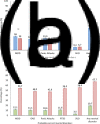Mental impact of Covid-19 among Spanish healthcare workers. A large longitudinal survey
- PMID: 35485802
- PMCID: PMC9069586
- DOI: 10.1017/S2045796022000130
Mental impact of Covid-19 among Spanish healthcare workers. A large longitudinal survey
Abstract
Aims: Longitudinal data on the mental health impact of the coronavirus disease 2019 (Covid-19) pandemic in healthcare workers is limited. We estimated prevalence, incidence and persistence of probable mental disorders in a cohort of Spanish healthcare workers (Covid-19 waves 1 and 2) -and identified associated risk factors.
Methods: 8996 healthcare workers evaluated on 5 May-7 September 2020 (baseline) were invited to a second web-based survey (October-December 2020). Major depressive disorder (PHQ-8 ≥ 10), generalised anxiety disorder (GAD-7 ≥ 10), panic attacks, post-traumatic stress disorder (PCL-5 ≥ 7), and alcohol use disorder (CAGE-AID ≥ 2) were assessed. Distal (pre-pandemic) and proximal (pandemic) risk factors were included. We estimated the incidence of probable mental disorders (among those without disorders at baseline) and persistence (among those with disorders at baseline). Logistic regression of individual-level [odds ratios (OR)] and population-level (population attributable risk proportions) associations were estimated, adjusting by all distal risk factors, health care centre and time of baseline interview.
Results: 4809 healthcare workers participated at four months follow-up (cooperation rate = 65.7%; mean = 120 days s.d. = 22 days from baseline assessment). Follow-up prevalence of any disorder was 41.5%, (v. 45.4% at baseline, p < 0.001); incidence, 19.7% (s.e. = 1.6) and persistence, 67.7% (s.e. = 2.3). Proximal factors showing significant bivariate-adjusted associations with incidence included: work-related factors [prioritising Covid-19 patients (OR = 1.62)], stress factors [personal health-related stress (OR = 1.61)], interpersonal stress (OR = 1.53) and financial factors [significant income loss (OR = 1.37)]. Risk factors associated with persistence were largely similar.
Conclusions: Our study indicates that the prevalence of probable mental disorders among Spanish healthcare workers during the second wave of the Covid-19 pandemic was similarly high to that after the first wave. This was in good part due to the persistence of mental disorders detected at the baseline, but with a relevant incidence of about 1 in 5 of HCWs without mental disorders during the first wave of the Covid-19 pandemic. Health-related factors, work-related factors and interpersonal stress are important risks of persistence of mental disorders and of incidence of mental disorders. Adequately addressing these factors might have prevented a considerable amount of mental health impact of the pandemic among this vulnerable population. Addressing health-related stress, work-related factors and interpersonal stress might reduce the prevalence of these disorders substantially. Study registration number: NCT04556565.
Keywords: Depression; epidemiology; mental health; post-traumatic stress disorder; stressful life events.
Conflict of interest statement
E. A. reports personal fees from Lündbeck, Esteve, Schwabe and Roche. E. V. reports personal fees from Abbott, Allergan, Angelini, Lundbeck, Sage and Sanofi, grants from Novartis and Ferrer and grants and personal fees from Janssen, outside the submitted work. J. D. M. reports personal fees from Janssen and Angelini, personal fees and non-financial support from Otsuka, Lundbeck and Accord, outside the submitted work. J. M. P. T. reports personal fees from Angelini, Janssen and Lunbeck, and grants from Janssen, outside the submitted work. R. C. K. was a consultant for Datastat, Inc., Holmusk, RallyPoint Networks, Inc., Sage Therapeutics and he has stock options in Mirah, P. Y. M., and Roga Sciences. All other authors reported no conflict of interest.
Figures

References
-
- Alonso J, Vilagut G, Mortier P, Ferrer M, Alayo I, Aragon-Peña A, Aragones E, Campos M, Cura-Gonzalez ID, Emparanza JI, Espuga M, Forjaz MJ, Gonzalez-Pinto A, Haro JM, Lopez-Fresneña N, Salazar ADM, Molina JD, Orti-Lucas RM, Parellada M, Pelayo-Teran JM, Perez-Zapata A, Pijoan JI, Plana N, Puig MT, Rius C, Rodriguez-Blazquez C, Sanz F, Serra C, Kessler RC, Bruffaerts R, Vieta E and Perez-Sola V and MINDCOVID Working Group (2021) Mental health impact of the first wave of COVID-19 pandemic on Spanish healthcare workers: a large cross-sectional survey. Revista de Psiquiatria y Salud Mental (Engl Ed) 14, 90–105. - PMC - PubMed
-
- Barroilhet S, Cano-Prous A, Cervera-Enguix S, Forjaz MJ and Guillen-Grima F (2009) A Spanish version of the family assessment device. Social Psychiatry and Psychiatric Epidemiology 44, 1051–1065. - PubMed
-
- Berry JO and Jones WH (1995) The parental stress scale: initial psychometric evidence. Journal of Social and Personal Relationship 12, 463–472.
-
- Blasco MJ, Castellvi P, Almenara J, Lagares C, Roca M, Sese A, Piqueras JA, Soto-Sanz V, Rodriguez-Marin J, Echeburua E, Gabilondo A, Cebria AI, Miranda-Mendizabal A, Vilagut G, Bruffaerts R, Auerbach RP, Kessler RC and Alonso J and Universal Study Group (2016) Predictive models for suicidal thoughts and behaviors among Spanish University students: rationale and methods of the UNIVERSAL (University & mental health) project. BMC Psychiatry 16, 122. - PMC - PubMed

